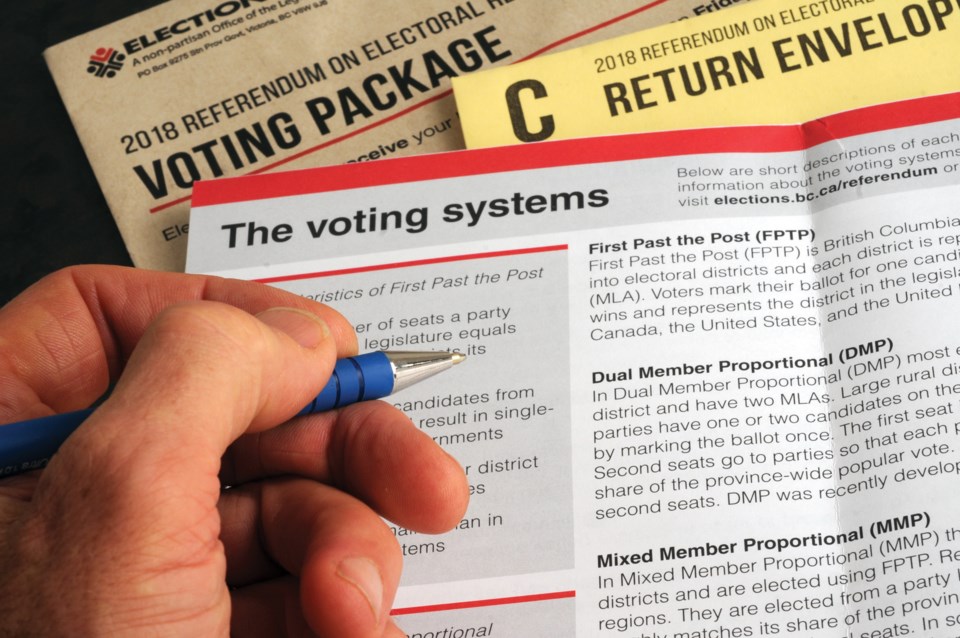Dear Editor:
Really? Who thinks the streets will be full of jack-booted, goose-stepping soldiers and violent protests whilst warning of neo-Nazi extremism if B.C. adopts a proportional system of voting?
That was the message proponents of first-past-the-post recently presented in TV ads. This type of fear mongering is not welcome in B.C. and more than anything, discredits the supporters of FPTP and undermines sane and reasonable debate. You only have to look south to see the consequences of inflamed rhetoric, mistruths, actually no, let’s call them by what they are, outright lies, to know this is not healthy; this is something I do not want to see in B.C.
FPTP has been around since the time of the rotten boroughs under the Westminster system; its time has passed and we need to look to a system that better reflects the world today. There is a reason that prospering nations have moved to PR. Look at New Zealand and Norway, for example They are doing pretty well all round.
One of the most repeated criticisms of a proportional representation system is that there is a likelihood of more minority governments. So what?
Please tell me what is wrong with our elected representatives having to co-operate and collaborate to move along what needs to be done. And things do get done under a minority government.
Of late, I have had to use our medical system pretty heavily. Each time I leave the hospital, clinic, or doctor’s office I think, “Thank you, Lester Pearson and your minority government, for giving us Medicare.”
I have recently retired and each month my CPP arrives in my bank account, the Canada Pension Plan having been put in place by a minority government.
Post-secondary education was opened up to anyone via the Canada Student Loan program, again the result of a minority government.
You get my drift.
Minority governments can be very productive if there is a will for collaboration and co-operation.
New Zealand is a good example of a move from first-past-the-post to a proportional representation system, with the proviso that if, after two election cycles the people were not happy with PR they could revert to FPTP. They did not; instead, overwhelmingly voting to stay with their MMP PR system.
What happens when regular citizens come together to look at which voting systems are best for B.C.? Answer: proportional representation wins by a landslide. In fact by 146 to seven. Did 146 people collectively experience a brain freeze? Of course not! That was a result from the B.C. Citizens’ Assembly on Electoral Reform, an innovative and copied process put in place back in 2004 by then-premier Gordon Campbell to look at electoral reform. Two people were randomly selected from every riding in the province to take part; I was one of the two from North Vancouver-Seymour. We heard a united message from British Columbians via public hearings, written submissions and community conversations.
Three reasonable requests resonated:
Firstly, make local representation more effective. The message came through that FPTP prevented MLAs from being community champions when the party position overruled community concerns. We overwhelmingly recommended a PR system because voters want their MLA to be a community champion.
Secondly, give voters more choice. Without choice you do not have a viable option to hold politicians accountable. Without being held to account politicians are free to serve vested and party interests. We overwhelmingly recommended a PR system to hold our politicians accountable.
Thirdly, put in place a system that delivers accurate outcomes. We heard “make my vote matter.” FPTP delivers extreme swings with small changes in voting, which leads to “false majorities” (when 65 per cent of voters do not vote for you but you are elected), wrong winners (more people vote against you than vote for you but you are elected) and missing local representation when party interests take precedence. We overwhelmingly recommended a PR system because voters wanted their vote to matter and reflect actual outcomes.
More than a decade ago, we considered, discussed and hashed out all we heard and recommended (by a vote of 146 to seven), a PR system known as BC-STV; a system where every single vote cast matters and is used. The bar set by the politicians for acceptance was unreasonably high: 60 per cent of ridings in the province had to accept a PR system and 60 per cent of voters had to vote for this. In actual fact, every riding in the province except for two voted for a PR system, so the first bar was overwhelmingly surpassed and close to 59 per cent of voters voted for the recommended system. Anywhere else, 50 plus one would be enough but not here! So the wrong winner prevailed.
We now have the choice of three good PR systems. They will work in B.C. Each has been designed with our population and geography in mind and will deliver the benefits of PR. The B.C. citizens’ assembly previously overwhelmingly decided that a PR system would meet the requirements for a successful voting system. Now, years later, it is simply up to you to vote for it.
Lynn Hill
North Vancouver
What are your thoughts? Send us a letter via email by clicking here or post a comment below.



